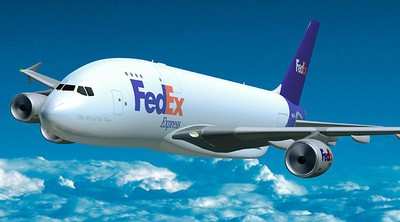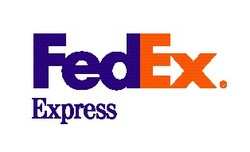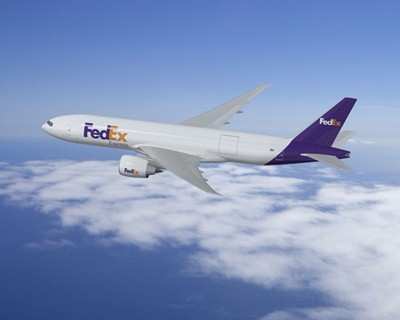Switches To Boeing 777 Freighters
Well, we knew it was coming... but it's from a somewhat
unexpected source. On Tuesday, international parcel carrier FedEx
announced it is cancelling its orders for 10 freighter variants of
the oft-delayed Airbus A380. That's the first cancellation after
Airbus announced in September
deliveries of the mammoth airliner would be delayed an additional
11 months.

FedEx also announced it has ordered 15 Boeing 777-200
Freighters, with options for 15 more, to replace the
A380-800Fs.
"Global demand for air cargo and express services continues to
grow rapidly and FedEx has made significant investments in our
network to meet customers’ needs and fulfill our business
objectives. Therefore, it was necessary and prudent for us to
acquire the Boeing 777 Freighter," said Frederick W. Smith,
chairman, president and chief executive officer, FedEx Corp. "The
availability and delivery timing of this aircraft, coupled with its
attractive payload range and economics, make this choice the best
decision for FedEx, its customers, shareowners and employees."
As Aero-News reported, FedEx
ordered 10 A380Fs, with options for 10 more, at the 2002
Farnborough Air Show.
 Airbus spokesperson
Barbara Kracht said the company regrets FedEx's decision, "but we
understand their need to urgently address their capacity
growth."
Airbus spokesperson
Barbara Kracht said the company regrets FedEx's decision, "but we
understand their need to urgently address their capacity
growth."
FedEx Express continues to be Airbus' largest widebody airplane
customer, and will add additional new and used Airbus widebody
aircraft to its fleet in coming years. Six new A300-600 aircraft
are scheduled to join the FedEx fleet in 2007.
The cancellation of FedEx's orders puts the entire A380
Freighter program in a questionable position -- as there remains
only two other customers for the cargo-hauling variant of the
superjumbo. FedEx competitor United Parcel Service (UPS) has 10
aircraft on order, while International Lease Finance Corp (ILFC)
has orders for five of the cargo planes on the books.
UPS is rumored to also be considering abandoning the A380F
program; if that happens, it's likely the entire A380F program
would collapse. While that would undoubtably be a significant blow
to an already troubled program, it would also allow Airbus to
deliver passenger-carrying A380s to expectant airline customers
that much sooner -- as those planes would fill delivery slots
originally slated for A380Fs.
Boeing 777
The Boeing 777 Freighter is the world’s largest
twin-engine cargo aircraft, with a range of more than 6,100
nautical miles and a revenue payload capacity of 171,000 pounds.
This represents a 2,200 nautical mile increase in range and an
additional 8,500 pounds of revenue payload over the MD-11F, which
is FedEx’s primary long-haul aircraft. These advantages will
result in more non-stop, point-to-point transoceanic routes with
shorter flight times, enabling improved service offerings to FedEx
customers. FedEx Express is expected to take delivery of four of
the 777 aircraft in calendar year 2009, eight in 2010 and the
remaining three in 2011.

"The Boeing 777F will allow FedEx Express to fly directly
between major markets and hubs in Asia, Europe and the U.S. with
more freight and in less time than it takes today, improving fuel
efficiency and lowering total operating costs," said David J.
Bronczek, president and chief executive officer, FedEx Express.
The first Boeing 777-200 Freighter is slated to for delivery to
Air France Cargo in 2008.
 ANN's Daily Aero-Linx (04.30.25)
ANN's Daily Aero-Linx (04.30.25) ANN FAQ: Turn On Post Notifications
ANN FAQ: Turn On Post Notifications Classic Aero-TV: Agile Aeros Jeff Greason--Disruptive Aerospace Innovations
Classic Aero-TV: Agile Aeros Jeff Greason--Disruptive Aerospace Innovations Aero-News: Quote of the Day (04.30.25)
Aero-News: Quote of the Day (04.30.25) ANN's Daily Aero-Term (04.30.25): Expedite
ANN's Daily Aero-Term (04.30.25): Expedite





